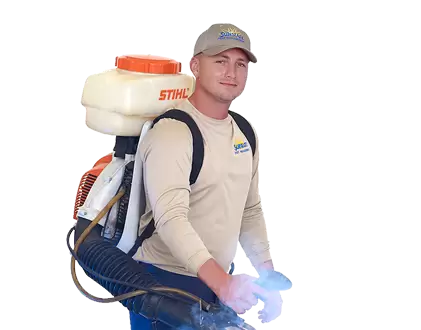

If you’ve ever seen a big green worm on some of your shrubs or garden vegetables, you may have just run across a cabbage looper. You can easily identify a looper simply by watching them crawl – they crawl by arching their back up high. This distinguishes them from cabbage worms or other similar-looking animals.
What is a cabbage looper?
A cabbage looper is actually a type of moth that is mottled brown in color which looks similar to tree bark. The worm you see is the larva stage of the looper. The looper can be found throughout the United States, Canada and Mexico and doesn’t seem too bothered by heat or cold. In the southern states where it is warmer during the winter, you can see some winter activity.
They get their name because they are attracted to gardens where crucifers are grown. Crucifers include cabbage, kale, broccoli, cauliflower, collards, rutabagas and watercress. You can also find them on tomato plants, squash, spinach, peas, lettuce, cucumbers and watermelon plants. They love flowering plants such as snapdragons and chrysanthemums as well as field crops like cotton or tobacco.
Luckily, the looper doesn’t do a whole lot of damage to mature plants. They usually eat sections out of the leaves and unless you have a lot of loopers or very young plants, most plants survived unscathed. They tend to leave most of the fruits and vegetables alone. However, when it comes to the flowering plants, they do like to eat the flower stalks and petals.
The adults have a wing span of approximately 1.5 inches. Once the looper becomes an adult, it no longer does damage to plants. Only the larvae are pests.
How to get rid of them?
Because they often feed on plants that humans eventually eat, it’s usually not advisable to use an abundance of insecticides. If the loopers are only eating some of the greens and haven’t really gotten into the plants, you might consider just letting them be.
If you have too many or don’t like the damage they are causing, you can use some homemade treatments. For just a few worms, simply pick them off by hand and get rid of them. If you have chickens, they make great chicken feed. You can find an organic biological treatment method designed for the looper that doesn’t do any damage to your plants and doesn’t bother other animals, such as your pets.
